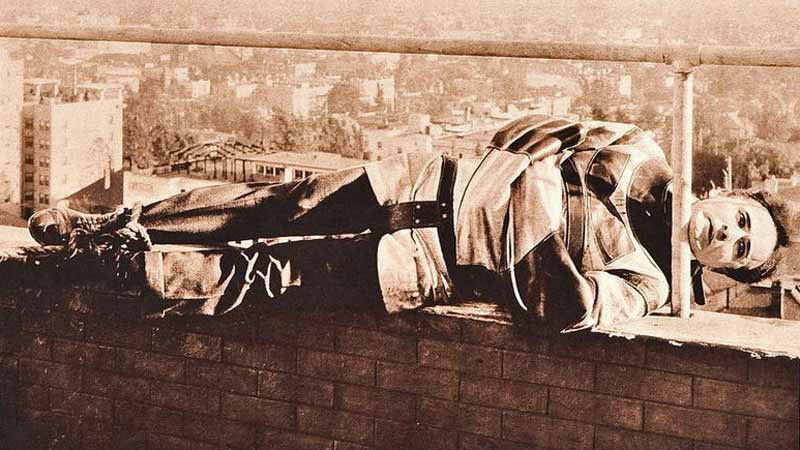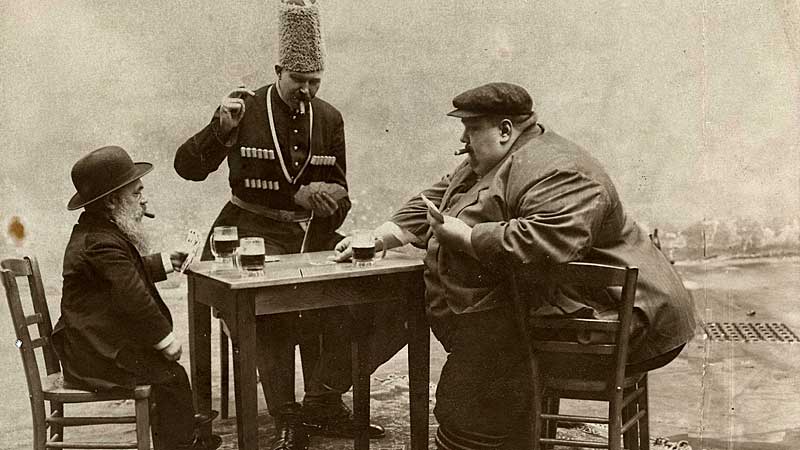Kevin James' "Inner-Workings of a Creative Mind" Podcast Interview
by Roland Sarlot and Christian Painter

What We'll Explore
Where do the ideas for the world's biggest illusions percolate? Kevin plays a mind game, discusses his perspective "seeing", how he handles negative thinking, the importance of a notebook, refining the final 2%, and hamster suits?
Who is Kevin James?
Kevin James has performed on TV in over 110 countries, starred at the Paris Crazy Horse, dazzled the prince of Monaco at a Royal command performance, headlined in Las Vegas, and his ''America's Got Talent'' performance went viral with 75 million views. Today, he is the closing act on the internationally touring, ''The Illusionists,'' and performs and creates their largest showstoppers. The largest names in magic stage his creations. He's a modern Buatier De Kolta.
Running Time:
The following interview has been edited and condensed for clarity.
What you can do
You are welcome to share up to 500 words of the below transcript in a non-commercial purpose provided you credit and link back to our site like this: "The Magic Oracle Business Podcast".
The Interview
Roland Sarlot: On this episode of the Magic Business Podcast, you'll hear this and more...
Kevin James: I've always wanted… you know the wheel of death in the circus where the guy gets on the wheel? I always wanted to do one of those, but in a hamster suit.
Roland Sarlot: Welcome to the Magic Business Podcast, where we share insightful and delightful inner secrets about the business of magic. This is where magic professionals present their real-life experiences and their most guarded secrets to help further your career in the magical arts. I'm your host Roland Sarlot in partnership with the MagicOracle.Club where you can hear all of our Magic Business Podcasts.
Today's guest has performed in TV in over 110 countries, starred at the Paris Crazy Horse, dazzled the prince of Monaco at a Royal command performance, headlined in Las Vegas, not at one casino but in just about every single one of them, and if that's not enough, it was his performance on the second season of ''America's Got Talent'' that made him an international sensation. His shocking sawing illusion went viral with nearly 75 million views.
Today, he is the closing act on the internationally touring, ''The Illusionists,'' and for the last eight years has traveled with them visiting way too many countries to even count and continues to perform and create their largest showstoppers. He's updated and invented new classics of magic, like 'The Sawing in Half,' 'The Bowling Ball Production' to 'Snow Animator,' to 'Coin in Bottle,' 'Floating Rose,' 'Chaplin Doll,' and 'The Amputated Arm,' and has more soon to be released. He's a modern Buatier De Kolta. The largest names in magic performance his creations and with all these credentials, he's still down-to-earth and always kind. Our Oracle of the day is none other than Kevin James.
Roland Sarlot: Kevin, welcome to the Magic Oracle.
Kevin James: Thanks, Roland.
Roland Sarlot: I wanna transport you back a few decades. When you created the 'Floating Rose,' did you have any idea how strong it would play or that you would still be performing it today?
Kevin James: I had no idea. You know, you just never know how anything's gonna happen when you create something new. It started off as a way to try to have a stage act. I was performing in restaurants and I was trying to find something I could do in people's living rooms at my private parties. And I thought, "Well, why not take something that I'm already getting a decent reaction with?" and it was 'Floating Bill' at the time. I was doing at the tables in the restaurants and decided, you know, that would be neat if I could expand it.
And so that was kind of simmering in the back of my head, and then one day I saw a bartender make a paper rose for a customer and it just immediately clicked. I thought, well, you know, you could do all the bill thing, all the bill animation stuff in the beginning and then twist it into that flower and it could be flash paper. So it actually all came together pretty quickly because I was already a thread-head and had the routine basically done. It was just kind of a finale for it.
And so it actually came together very quickly. A friend of mine went to go see Copperfield the other day and he asked him, ''Why are you still doing 'The Floating Rose' in your act?'' And he said, ''Well, I tried taking it out but the audience won't let me.'' He basically said that out of all of his tricks, if Copperfield has ever had any show, that's the one that stayed in the longest.
Roland Sarlot: And it's still playing today. For you, is creativity nature or nurture?
Kevin James: I think it's both. You know, I don't really have any particular formula for coming up with ideas. I just try to live life with a, you know, an air of curiosity all the time. I wake up every morning expecting to find something new and interesting that maybe I can massage into something for the show. And I just know that interesting things are gonna happen. And I think it's about just, you know... Gaetan Bloom kind of led me into this way of thinking, just be curious about everything.
Try to read as much as you can about all sorts of topics like how does a light switch work? How does an airplane stay on the air? You know, I mean, just be curious about everything. And sometimes I'll have a method, you know, just an interesting method for something, but I don't have a trick or I don't have a premise. Sometimes I'll have a premise and not have a trick. Sometimes I'll have a piece of music that just makes me feel a certain way or I just saw a movie that had a great message and I think, "Oh, maybe I could find a way to tweak that for the show."
So sometimes I'll have a need in the middle of the show where I need to transition from this scene to this scene or this trick to this trick and so I need something to put in the middle that'll help bridge the gap. And I try to find things that will resonate that will have certain emotions, pull out various emotions. I don't want the same emotion. I don't wanna sing the same kind of song, you know, with every effect.
So some things are nostalgic, some are sweet and innocent, other things are shocking, other things are macabre. All with an air to humor, you know, keeping it kind of tongue in cheek and fun, you know, just trying to find different emotions and different feelings because that's basically what it is, we're just trying to make the audience feel things.
Roland Sarlot: So when these ideas come to you, do you keep a creativity notebook?
Kevin James: Yes. Sometimes, I'll scratch it on wherever I am at, you know, a place mat in a restaurant or a napkin but yes. I use a lot of legal pads too. But absolutely in a hardbound book, I'll try to use the computer, try to have my master list of notions, and they're all in various stages of development. And the thing is that sometimes, I used to in the early days, I would think of some grand idea and just kind of brush it off and not write it down by thinking, "Oh, it's gonna be too expensive," or, "I have no place to perform something this crazy or big or extravagant." And then I realized that you have to write them all down because someday your circumstances might change and an opportunity drops in your lap and you need it.
Roland Sarlot: So what comes first for you, is it the trick that you try to change and come up with something new or do you start with an effect and then try to figure out methods?
Kevin James: That's another thing... sometimes I'll see a classic effect and go, "Oh, you know what? That could really be updated." Maybe there's some new technology or some new theatrical thing that would just, you know, make it great. You know, like with the sawing, you know, we're actually celebrating 100 years of that trick being done. And it's a classic effect. It's gone through a lot of incarnations, but, I was at my Mike Caveney’s house one time and he said, ''Hey, open up that trunk.'' And I opened it up and it was all these manuscripts and photos of different sawing in half versions throughout the years.
And he showed me some photographs of kind of that method. Thurston was gonna try it and then he never did. And then one of Thurston's assistants, after he had passed away, tried it and they created a version, but it only lasted like a few months. I didn't really like what I saw as far as it wasn't very fooling the way they actually had made the thing. But then I had said, there's some little notion of really amazing, you know, piece of magic there. So I said, ''Well, I wanna work on that and try to update it and try to take it to another place.'' So after a lot of trial and error, it finally turned out to be pretty good.
Roland Sarlot: It sounds like Thurston should give you his cape! Do you ever have a voice in your head that says that'll never work?
Kevin James: All the time. I have people that tell me that.
Roland Sarlot: And what do you say? What do you say back to that voice?
Kevin James: I put it in the closet and let it sleep for a couple of days and see if it still feels the same way after my subconscious has a few nights to play around with it.
Roland Sarlot: And come back with it with a new answer?
Kevin James: Yeah. And sometimes I'll be stuck on something and I'll think, "How would Le Roy, or Jarrett, or De Kolta approach this problem?" So I think it's important to study, not only to know who invented what and how everything works. And so you need to fill your brain with all sorts of information. You know, it's funny because I know so many young people today that they don't read books, they just watch videos and watch YouTube. There's just so many good things in books that will never be on a video.
Roland Sarlot: You mean you have to read?
Kevin James: Yeah, amazing.
Roland Sarlot: How did Paris or international traveling influence your creativity?
Kevin James: I would have shows here and there but once I got to the Crazy Horse, I was doing the same show, like three times a night, seven nights a week for three months. So you just get so good at that act that you start to work on the super nuances of it. I mean, things don't get really good until you're completely bored with them. The only way to do it is to just do it a million times. You know, it's a never-ending quest to get that last few percent of a trick's potential.
Roland Sarlot: And keep pushing and pushing.
Kevin James: Yeah. It's never-ending.
Roland Sarlot: Do you like solving open-ended problems or do you like problems with boundaries? Do either one give you more creative juice?
Kevin James: I find that if I have some boundaries, it's easier to create. Like, if you have a specific problem you're trying to solve, like I need to figure out some way to get from this trick to this trick. If it's too open, it's just not enough direction, you know? If you have somebody with a well-defined character, it's kind of easier to write for them than if it's kind of nebulous. I need some boundaries, yes, but I try to keep an open mind.
Roland Sarlot: Right, it's almost counter-intuitive, isn't it? The more boundaries you have, the more creativity.
Kevin James: Yeah. Yeah. I have some friends that just always tell me, you know, ''Oh, I'm just not a creative guy, and I just can't really come up with ideas.'' And I just think it's baloney. I think everyone can teach themselves to be creative if they want to do it. It's just extra work instead of, you know, buying that latest trick on the market. And you know, why not start it in another direction and say, "What's the most amazing thing I could ever do?" and try to figure it out and try to work it out backward from that.
And it's funny, I'll come up with three or four different methods and then you have to go through each method and say, "Well, what are the bad points that can be hidden and what are the good points that can be accentuated?" And sometimes, like with the 'Chaplin Doll,' the first method, I've kind of stuck with it. I tried a couple of other methods. Like one time I built a Chaplin box that was laying on its back with the lid open of the case and the body parts were sitting out in front of the case.
Antonio was inside like half of the legs and then there was a shell attached to the front of the box. And basically, I was stacking the body outside of the box and he was kind of like getting into part of the costume a little bit at a time. And on paper, it looked pretty clever, like it was gonna be great, but then once he got into it and had to do his Chaplin character, he was just ''Sorry, dude. I know you spent a lot of time and money but I'm not feeling the character right now with all this junk on me.'' Yeah. So now it's a storage box in my house.
Roland Sarlot: That you put a lot of blood into.
Kevin James: Yeah.
Roland Sarlot: Do you have any suggestions for our listeners that are asking how they can be more creative? Can you name a couple of ideas for them?
Kevin James: Yeah. You know, I just think expect from yourself that you're gonna find something new. You just have to be in that state of mind that you know you can do it and it's gonna happen and you just keep your eyes open to everything. I mean, I'll walk down the street and I'll see like a lamp post or some kind of a street light or something and I'll be thinking, "You know, if you put a mirror between that pole and that pole, you could produce somebody on top of that fence." You know what I mean? I'll see things out in everyday life that could be tweaked to create some amazing trick. Like I was watching a tennis match on TV one time and the angle from the announcer's box, it's kind of at the end of the court...
Roland Sarlot: Of one corner, yes.
Kevin James: ...from one end up high. Well, you know, if you would look at the net, you could have a mirror on the net, right? And there's like a dead zone from that position behind the mirror where you could have like 15 people laying flat on the court, right behind that net. And if you put a person in the back court of each side and they were good tennis players, so they could keep the ball in play like deep in the court, you would never know that there was a mirror there, right?
So the idea was to have a mirror and then on the back of the mirror would be the same surface as the court. And so then you just have to cover up where the announcer is, kind of behind the camera, then I'd kind of peek around to the front and I could just take like a business card or something and then stick it in sideways in front of the camera and turn it sideways so that we’re facing the camera and then the people laying on the court could flip the mirror flat on the court and then stand up. And now I just produced 15 people on the middle of an open tennis court.
And then I was writing an article with Gaetan Bloom for ''MAGIC Magazine.'' We did like a series of articles and it was kind of a game that we were playing. Like, I would come up with an idea and then he would think about it. And then, he would come up with an idea and I would brainstorm on it. And then in the same issue, we would put the original idea and then brainstorm. So you could see them both at the same time. And when I gave that idea to Gaetan, he said, ''Well, you know what, why don't you have these tennis players, like hit a ball too hard and gets hurt and the guy gets injured. One guy gets injured and then you stick the business card in. And when you do it, it's like 15 medical staff and first responders there to take care of the tennis player, you know?''
And so it was just a great way to dress the routine. I think the biggest thing to tell new people is to find people that you trust, that you like to brainstorm with, and make it fun. Don't make it a job, just sit with them and just start coming up with crazy ideas, "Oh, you know, I always thought this would be great. What about this?" And then he would say something about, "What about this?" And just think of nutty stuff so that it becomes a habit and it becomes kind of a game. It becomes fun.
And, you know, I have a weekly meeting, I've got three or four guys that I brainstorm with. Gaetan Bloom is one, Rafael from Belgium is another, and Adrian Solare. He lives in Barcelona. So we all hop on zoom each week and just brainstorm about stuff. And it's kind of the highlight of our week. You know, if we're working on something for our own act, we bring it to the group and we go, "Hey, what do you guys think about this? And now you've got a group of people that you love and trust that wanna see each of us succeed. So it's, I think finding your group would be a great start.
Roland Sarlot: Yeah. That's a great idea. And you also said basically change your thinking, change your perspective.
Kevin James: Yes. Live with the knowledge that you can do it and that you're gonna find interesting stuff and just fill your brain with as much as you can about everything. And even things like… I was talking with Teller one time and I said, "Obviously you create the magic and Penn creates the comedy.'' And he basically said, ''Well, we're both really good at solving different problems.'' You know, Penn's really great with the social commentary and the comedy and stuff. And he goes, ''And I'm kind of the deep diver into the methods, finding creepy stuff.'' Find your group and find your specialties and don't be intimidated, it takes practice. It's a muscle. You have to work it out to get strong.
Roland Sarlot: Great advice. Kevin, I'd like to play a little game with you. I'd like you to design a trick with three or more of these items. It doesn't have to work, it's just a concept. How would you put these three of these pieces together: bullfrog, a measuring tape, clown shoe, chocolate cake, flash paper, hamster wheel, and that could be a hamster wheel of any size, and of course, the finale is snow. Any three items you want, you can add more items if you'd like. Three together, see if you can come up with some magical concept. And while you do it, if you can talk out loud, so we can hear your process.
Kevin James: Well, let's see. Yeah, I never start it this way.
Roland Sarlot: I'm being mean.
Kevin James: I mean, I've always wanted… you know the wheel of death in the circus where the guy gets on the wheel? I always wanted to do one of those, but in a hamster suit.
Roland Sarlot: Would you be wearing red clown shoes?
Kevin James: And eating chocolate cake.
Roland Sarlot: And people throwing bullfrogs at you.
Kevin James: While it's snowing. Yeah.
Roland Sarlot: Exactly. Very funny. Okay, Mr. Oracle of creativity, the Magic Business Podcast can be heard at the MagicOracle.Club, however today, you are our guest Oracle. So Oracle Kevin, what's the one important question someone should ask you but never does?
Kevin James: Sure. You know, the one question... I think it's something we should all think about is, why? That's the big question. Why are we doing this effect and why should the audience care about it? So I think if we can, answer that question, whenever you're trying to decide if you're gonna put something in your show or not and I think you'll be more in a better direction to create something compelling.
Roland Sarlot: Kevin, it was an absolute blast having you on the show. Thank you.
Kevin James: Thanks for having me, Roland.
Roland Sarlot: And thank you for listening to our Magic Business Podcast. Please visit the MagicOracle.Club, where you can hear all the Magic Business podcasts and enjoy a vast array of additional magical knowledge, as well as find live magic shows near you.
Today we'll leave you with a message from the avant-garde pop artist, Andy Warhol, who said, ''You have to do stuff that average people don't understand because those are the only good things worth doing.''
As always, we at the Magic Oracle wish you great success doing ''good things'' on your path in the magical arts.
A Jolly Genie?

The Magic Oracle is a FREE site but I still must pay dastardly server fees! Please, donate ANY amount... $1, $5, $10, why not $1 million?
THANK YOU for keeping magic alive... and me, a Jolly Genie!



